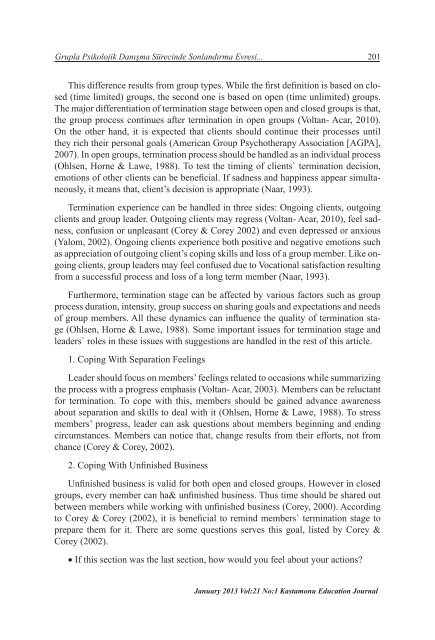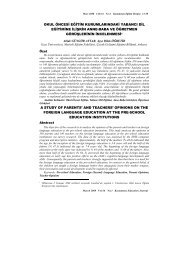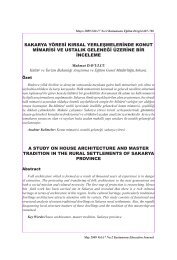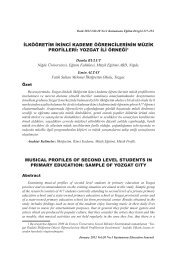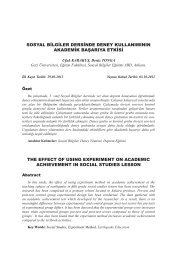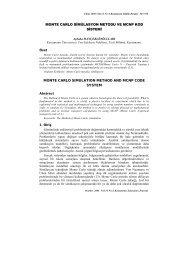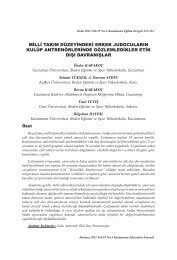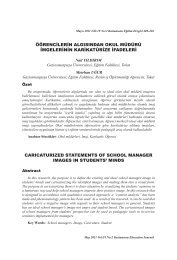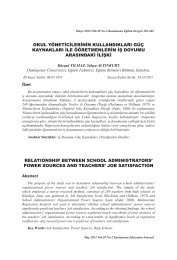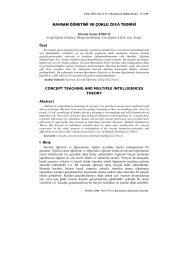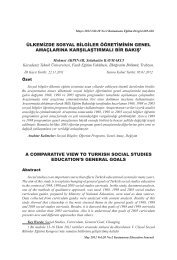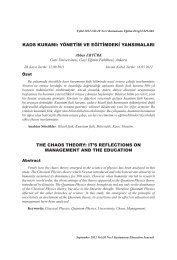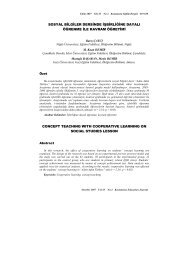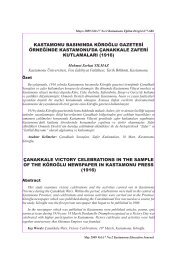Grupla Psikolojik Danışma Sürecinde Sonlandırma Evresi
Grupla Psikolojik Danışma Sürecinde Sonlandırma Evresi
Grupla Psikolojik Danışma Sürecinde Sonlandırma Evresi
You also want an ePaper? Increase the reach of your titles
YUMPU automatically turns print PDFs into web optimized ePapers that Google loves.
<strong>Grupla</strong> <strong>Psikolojik</strong> <strong>Danışma</strong> <strong>Sürecinde</strong> <strong>Sonlandırma</strong> <strong>Evresi</strong>... 201<br />
This difference results from group types. While the first definition is based on closed<br />
(time limited) groups, the second one is based on open (time unlimited) groups.<br />
The major differentiation of termination stage between open and closed groups is that,<br />
the group process continues after termination in open groups (Voltan- Acar, 2010).<br />
On the other hand, it is expected that clients should continue their processes until<br />
they rich their personal goals (American Group Psychotherapy Association [AGPA],<br />
2007). In open groups, termination process should be handled as an individual process<br />
(Ohlsen, Horne & Lawe, 1988). To test the timing of clients` termination decision,<br />
emotions of other clients can be beneficial. If sadness and happiness appear simultaneously,<br />
it means that, client’s decision is appropriate (Naar, 1993).<br />
Termination experience can be handled in three sides: Ongoing clients, outgoing<br />
clients and group leader. Outgoing clients may regress (Voltan- Acar, 2010), feel sadness,<br />
confusion or unpleasant (Corey & Corey 2002) and even depressed or anxious<br />
(Yalom, 2002). Ongoing clients experience both positive and negative emotions such<br />
as appreciation of outgoing client’s coping skills and loss of a group member. Like ongoing<br />
clients, group leaders may feel confused due to Vocational satisfaction resulting<br />
from a successful process and loss of a long term member (Naar, 1993).<br />
Furthermore, termination stage can be affected by various factors such as group<br />
process duration, intensity, group success on sharing goals and expectations and needs<br />
of group members. All these dynamics can influence the quality of termination stage<br />
(Ohlsen, Horne & Lawe, 1988). Some important issues for termination stage and<br />
leaders` roles in these issues with suggestions are handled in the rest of this article.<br />
1. Coping With Separation Feelings<br />
Leader should focus on members’ feelings related to occasions while summarizing<br />
the process with a progress emphasis (Voltan- Acar, 2003). Members can be reluctant<br />
for termination. To cope with this, members should be gained advance awareness<br />
about separation and skills to deal with it (Ohlsen, Horne & Lawe, 1988). To stress<br />
members’ progress, leader can ask questions about members beginning and ending<br />
circumstances. Members can notice that, change results from their efforts, not from<br />
chance (Corey & Corey, 2002).<br />
2. Coping With Unfinished Business<br />
Unfinished business is valid for both open and closed groups. However in closed<br />
groups, every member can ha& unfinished business. Thus time should be shared out<br />
between members while working with unfinished business (Corey, 2000). According<br />
to Corey & Corey (2002), it is beneficial to remind members` termination stage to<br />
prepare them for it. There are some questions serves this goal, listed by Corey &<br />
Corey (2002).<br />
• If this section was the last section, how would you feel about your actions?<br />
January 2013 Vol:21 No:1 Kastamonu Education Journal


